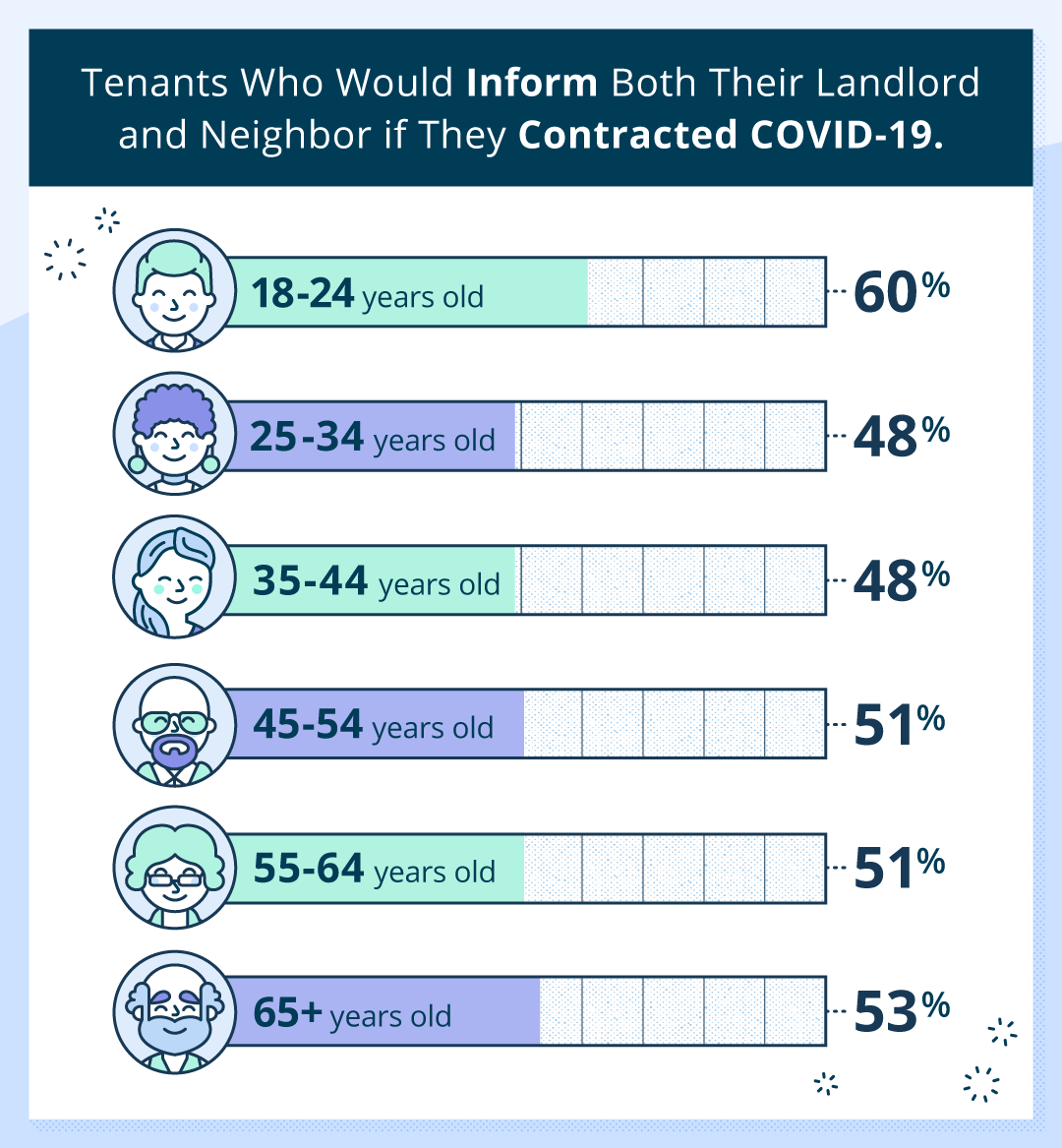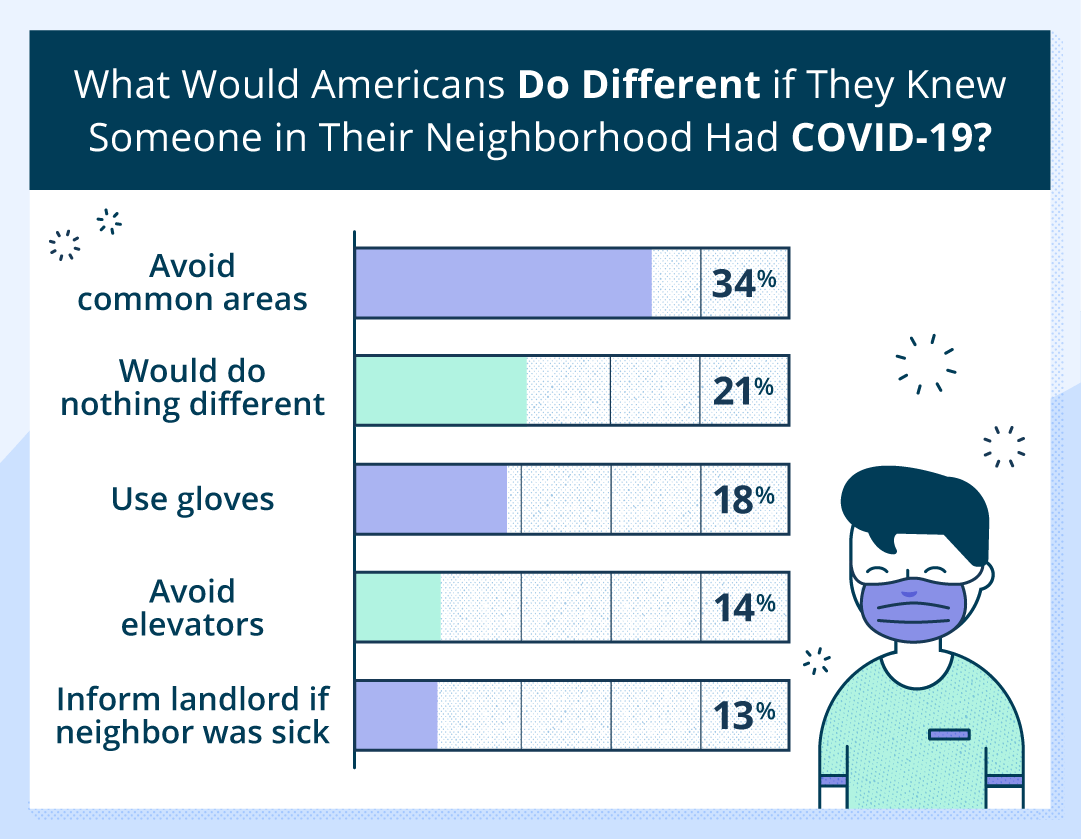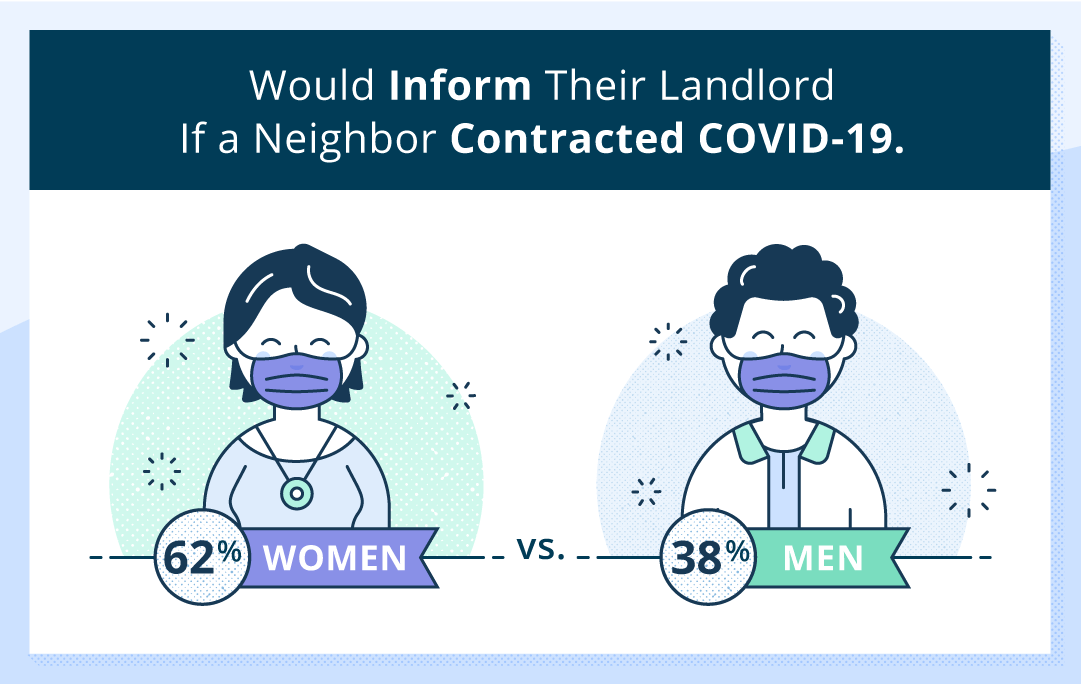9 min read
How to Get Property Management Clients (Lead Gen Methods)
With such a competitive and fast-paced real estate market, especially rental markets, knowing how to get property management clients is crucial for starting and...

As a landlord in today’s environment, renting out to tenants may present some questions such as what to do if someone in your complex were to contract COVID-19. Many renters may also have increased concerns about the spread of COVID-19 due to living amongst their fellow neighbors. While many landlords and living communities have established safety guidelines to keep themselves and tenants healthy, living in a close community, such as an apartment complex, can present a unique set of challenges.
In an effort to gauge American renter attitudes towards COVID-19, we surveyed 3,000 Americans to see what they would do if someone in their living community tested positive for COVID-19.
Disclaimer: Since rules may vary by state and location, always be sure to check out local COVID-19 laws and guidelines.
During this time of uncertainty, Americans remain fairly divided on disclosing COVID-19 to landlords and neighbors — 48% of Americans would refrain from telling both their landlords and neighbors if they contracted COVID-19.

18 to 24 year-olds were most likely to disclose a COVID-19 infection compared to other age groups. When looking at renter attitudes towards COVID-19 in terms of age, about 60% of 18 to 24 year-olds would alert both their landlord and neighbors if they contracted COVID-19.
Contrastingly, 23% of respondents said they wouldn’t tell anyone in their living community at all. 25 to 34 years olds and 35 to 44 years olds were the most likely groups to not disclose a COVID-19 infection:

As the pandemic continues to impact communities, landlords and residents of apartment buildings may be faced with the reality of a tenant testing positive. Because of this, we were curious about how Americans would react if someone in their immediate living community was diagnosed with COVID-19.
When asked about what they would do differently if they found out their neighbor contracted COVID-19, 34% of respondents said they’d only be worried about visiting the apartment’s common areas. 18% of respondents would use gloves and 14% would avoid elevators.
Additionally, 21% of respondents would not be concerned if their neighbor contracted COVID-19 at all. This lack of concern was predominantly seen among men, as they were two times more likely than women to be unconcerned.

While only 13% of tenants would actually inform their landlord if they found out their neighbor contracted COVID-19, there’s a big gap in how each gender would handle this knowledge.
At 62%, women were nearly two times more likely than men to tell their landlord if their neighbor contracted COVID-19.

If you’re a tenant and you or your neighbor tests positive for COVID-19, you might be wondering what is safe to do, what should be avoided, and if you should tell anyone. According to experts, there are certain steps you can follow in your living community to handle the situation smoothly if the problem arises.
According to Paula Cannon, a professor of molecular microbiology and immunology at the University of Southern California, if you’ve been in close contact with a neighbor who has tested positive for COVID-19, you should notify them. However, if you haven’t been in close contact with anyone, then you’re not obligated to.
If you live in a smaller complex where tenants are close with one another, both in proximity and in relationships, ask your neighbors what they’re comfortable with in terms of notifying the landlord or telling one another in the event someone tests positive.
If you’ve spent a good amount of time in common areas like a lounge, be proactive and tell your landlord or a maintenance team so they can be sure to disinfect the area. Since these rules may vary by state and location, always be sure to check out local COVID-19 laws and guidelines.
While living in an apartment complex close to neighbors, social distancing can feel tricky. In addition to following the Center for Disease Control’s guidelines, authorities in New York and New Jersey recommend one solution to avoid crowding in common areas is to limit the number of people in the elevator at the same time.
Consider also only sharing the elevator with your own party, or wait for the next one if it’s full. Alternatively, you can take the stairs if that’s an option. You can also take extra precautions by wiping down other high trafficked areas, such as mailboxes and door handles.
If you’re a landlord renting to tenants, there are ways to encourage and educate everyone to take these everyday precautions to help keep your living community safe.
If you’re a landlord, consider using these tips to help create a safer environment for your tenants. Additionally, we’ve put together this COVID-19 resource guide to help you further navigate the pandemic landscape as a landlord. To make finding the right tenant for your property easier during this pandemic, visit our rental application and tenant screening services.
This study consisted of three survey questions conducted using Google Surveys. The sample consisted of no less than 1,500 completed responses per question for a total of 3,000 respondents. Post-stratification weighting has been applied to ensure an accurate and reliable representation of the total population. All age range data presented in the findings come from Google Consumer Surveys. The survey ran during August 2020.
Disclaimer: TurboTenant, Inc does not provide legal advice. This material has been prepared for informational purposes only. All users are advised to check all applicable local, state, and federal laws and consult legal counsel should questions arise.
9 min read
With such a competitive and fast-paced real estate market, especially rental markets, knowing how to get property management clients is crucial for starting and...
8 min read
Condo property management, on its face, is exactly what it sounds like — overseeing one or many units in a condominium building...
7 min read
Finding the ideal commercial or residential rental property can be challenging for renters, as it may only meet some of their specific...